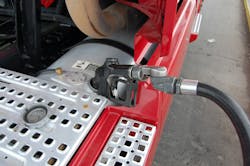Survey ranks payback of fleet fuel-efficiency initiatives
A survey of over 65 motor carriers provides insight on the return on investment (ROI) fleets are experiencing from implementing fuel-efficiency initiatives including the Environmental Protection Agency’s (EPA) SmartWay program.
The survey was conducted by Transplace, a provider of transportation-management services and logistics technology, along with PepsiCo, EPA and several carriers, including J.B. Hunt, Con-way, Western Express, Smith Transport and Dart Transit,.
Along with the ROI impact, the results detail which fuel-efficiency initiatives fleets are deploying as well as challenges encountered when rolling out the initiatives.
“We designed this survey, which grew out of the PepsiCo sustainability team, with key input from leading shippers and carriers such as PepsiCo, Con-way, J.B. Hunt and Western Express,” said Ben Cubitt, Transplace’s senior vp-- consulting and engineering.
In all, 65 fleets—comprising a mix of regional, national and private fleets, responded to the survey. Of the 65, 59 are SmartWay-verified carriers. The survey found that a “number of SmartWay initiatives have been implemented by almost every fleet surveyed,” making for an implementation rate of above 75%.
The fleets surveyed ranged in number of tractors from 0 to 150 (12 carriers) up to 1501+ (15 carriers). By number of trailers, the smallest range was 0 to 300 (12 carriers) all the way up to 6001+ (8 carriers).
The respondents were asked if the given fuel-efficiency initiative had been evaluated, implemented or rejected. They were also asked to if the payback or RPI had exceeded, met or under-performed expectations and if it was “difficult, easy or other” to implement.
Of the initiatives studied, the highest ROI came from highway speed reduction, driving training and progressive shifting. These actions – along with recording engine data for greater driver feedback – also were the most commonly implemented among the carriers surveyed.
Additionally, many carriers reported they are implementing aerodynamic mirrors and verified low- rolling-resistance tires. Other initiatives, including tire-pressure monitoring systems and trailer-gap reducers, had “a more limited deployment across the fleets.”
Some fleets have implemented such initiatives “with expected ROI” and other fleets are either still evaluating the initiatives or have had more mixed results following implementation, according to Transplace.
These SmartWay initiatives have not been implemented by most of the fleets surveyed: Truckstop electrification, “advanced trailer end fittings,” nitrogen-filled tires and “verified retrofit technologies (Cummins, Cat, Donaldson, etc.).”
These initiatives recorded the widest variance in fleet measurements of payback, in terms of whether they exceeded expectations, met them, fell below them or were not measured: auxiliary power units, intermodal shipping, trailer side skirts, and verified low-rolling-resistance tires.
And these initiatives were mostly rated “below” expectations in terms of ROI: single wide-base tires, particulate-matter filters, emission control, and vehicle battery system (heating and cooling).
SmartWay initiatives were also ranked by ease of implementation. These, in descending order by ease of implementation, were rated as easiest to implement: verified low-rolling-resistance tires, reducing highway speed, progressive shifting, aerodynamic mirrors (tractor), driver recognition/incentives, record engine data (for driver feedback) and fuel-operated heaters.
On the other hand, these initiatives were ranked as the most difficult to implement (listed in descending order by difficulty of implementation: single wide-base tires, auxiliary power units, [vehicle] weight reduction and driver training.
But, as noted above, driver training also turned out to deliver one of the highest ROI of any fuel-efficiency initiative covered by the survey .
Transplace pointed out that with “transportation-related emissions accounting for a quarter of all greenhouse gas emissions in the United States, demand for corporate citizenship and leadership has increased. SmartWay offers information to help industry leaders make innovative carrier, modal and technology decisions that improve performance, save fuel and reduce costs. The SmartWay program delivers standardized tools and information needed to help the freight sector measure, benchmark and report supply-chain environmental performance.”
“We will continue our commitment to this initiative by investing engineering resources to include more carriers in the survey, continuing to update and modify the survey,” added Cubitt, “and conducting additional analysis in focus areas.”
“Striving for cleaner, more efficient transportation is a key part of PepsiCo’s commitment to making environmentally sustainable practices part of our daily operations,” said Mike O’Connell, senior director of fleet operations for PepsiCo’s Frito-Lay North America division. “Co-sponsoring this survey with Transplace led to valuable insights from the participating carriers that we believe will benefit leaders across the industry, who are striving to make their fleets more efficient.”
